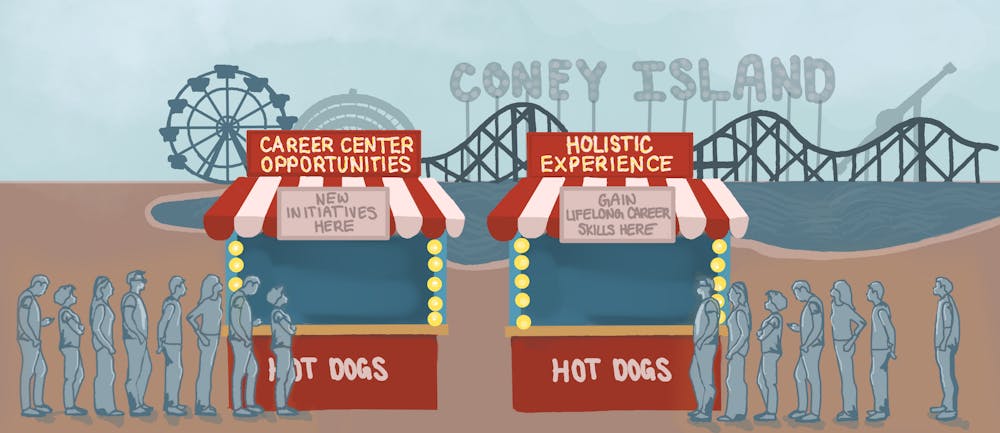“What have you been doing this summer?” If this is a question you have heard from friends, family and even acquaintances over the last month since finals ended, you are not alone. For many, the unspoken subtext to this question has been an inquiry into whether you are engaging in work experience over the summer. And, equally for many, this question will elicit feelings of dejection, having been unsuccessful in the internship application process of what is an increasingly competitive environment. In order to ameliorate both this feeling of unhappiness from failing to attain work experience and the competitive application process that catalyzes it, the University should look to improve its career resources. And we, as students, should look to amending our at times narrow mindframes which categorize internships as the only worthwhile summer experience.
The competitiveness of the current work experience market has been exacerbated due to recent cost-cutting initiatives by the federal government, which have led to federal internship openings being cut. Nevertheless, the difficulties in attaining an internship do not arise in a vacuum. The number of applications per internship has more than doubled since 2023. Meanwhile, the number of internships posted on Handshake has fallen nearly 15 percent. Combined, these statistics depict a trend over time of increasing applications but decreasing openings — a trend which diminishes the likelihood of attaining a work experience role through recruiting. This pernicious combination has led to a hyper-competitive reality for internships in which many exit the recruiting cycle without success and instead with feelings of anxiety, disappointment and inferiority.
Given this challenging internship predicament and the troubling feelings it begets, the importance of career centers has never been more evident. Broadly speaking, career centers at universities have a crucial impact on connecting students with the job market — the average number of job offers rises from one to 1.24 for a student who has used at least one career service.
In light of this newly competitive environment, the Career Center at the University has, to some extent, endeavored to afford students opportunities geared towards attaining work experience. Emails sent last semester to students from Nicole Hall, the new dean of students and senior associate vice president for student affairs at the University, have outlined a project from the Career Center which reactively connects students without an internship or job with University alumni who can offer them some kind of work experience. This new initiative comes on top of various other offerings from the Career Center, from resume workshops to organized information sessions, interview preparation and more. In these regards, an increasing number of accessible resources serve to help remedy the effects of the hyper-competitive landscape.
Though these resources are a step in the right direction, the consistent difficulties in attaining work experience for many students serves to show that the Career Center must continue to expand its offerings to students. Several additional initiatives currently not in place at the University have been found to be successful in strengthening the effectiveness of career centers elsewhere. Programs that students might benefit from in this regard include mandatory freshmen career exploration and an emphasis on consistent four-year engagement between students and career centers. These measures understand that collaboration with career centers is essential throughout the entirety of one’s college career in order to successfully find work experience.
While work experience remains a sought-after way to spend one’s summer, it is also important to acknowledge a related truth — failing to attain full summer work experience is not the end of one’s career hopes. Though sector-specific experience may be received through an internship, the flip side of this coin is that it also narrows you into solely focusing on that field. Indeed, the competitiveness of the work experience field can often distract from the multiplicity of equally valuable soft skills that can be found in alternative summer experiences.
Online courses and skill development programs, engaging in research or even working in more general fields, like as a camp counselor, can be useful for gaining experiential and interpersonal skills. And as employers increasingly place an outsize emphasis on skills-based hiring, it is the traits these less conformative summer pathways offer that could serve to differentiate a student in a stack of resumes. In this way, it may be beneficial for students to recognize that, whilst internships are always valuable, they are not the end-all be-all of the positive and skill-building opportunities that a three-month-long summer can offer.
And so, as current students enjoy their summers in a variety of ways and incoming students look forward to an education that holds a cornucopia of opportunities for their future, it is important to maintain an open-minded approach to summer work experience. For the Career Center, this can be done by identifying ways to implement policies that ensure greater success in their recruiting for work experience. For students at the University, it means not only being proactive in applying for work experience, but also understanding that these offerings are far from the only advantageous opportunity as you begin to consider your future career.
The Cavalier Daily Editorial Board is composed of the Executive Editor, the Editor-in-Chief, the two Opinion Editors, a Senior Associate and an Opinion Columnist. The board can be reached at eb@cavalierdaily.com.







